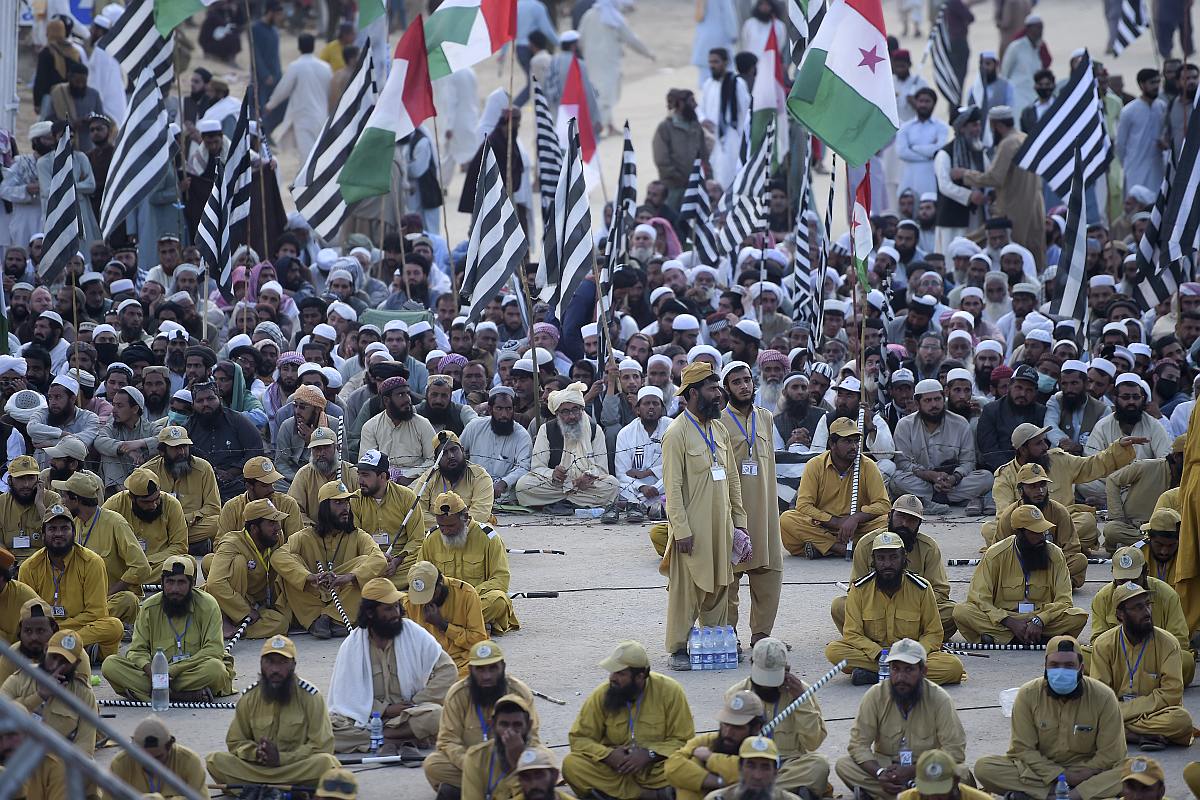Securing India’s coast through multi-agency ops
The importance of coastal security was acknowledged long ago. In the evolving world, types of threats have diversified.
Addressing thousands of protesters on Thursday night, Maulana Fazlur Rehman said the government negotiators should not come for talks if the prime minister’s resignation is off the table.

Activists and supporters of Islamic political party Jamiat Ulema-e-Islam (JUI-F) attend an anti-government "Azadi (Freedom) March" in Islamabad. . (Photo by Aamir QURESHI / AFP)
Pakistan Prime Minister Imran Khan seems to be having a taste of his own medicine as the country’s Opposition leaders, led by firebrand cleric-cum-politician Maulana Fazlur Rehman, on Thursday gave him a 48-hour ultimatum to resign, saying the massive anti-government protest will take a new direction after two days. The right-wing Jamiat Ulema-e-Islam Fazl (JUI-F) leader is leading the massive protest dubbed as ”Azadi March”, which entered the seventh day on Thursday, demanding Prime Minister Khan’s resignation, accusing him of “rigging” the 2018 general elections. Khan’s inability to improve the declining economy of the country is also one the reasons cited by the Opposition to oust him.
Addressing thousands of protesters on Thursday night, Maulana Fazlur Rehman said the government negotiators should not come for talks if the prime minister’s resignation is off the table.
“No need to come to us. When you come, you must come with the intention of leaving the corridors of power behind,” he was quoted as saying by Geo TV.
Advertisement
“You are at a dead end now and now you must decide whether you want to continue to remain there or come out and give back the people their right,” Maulana Fazlur Rehman said, addressing the prime minister.
He said the opposition leaders do not want NRO from Khan, instead they will not give it to him. Meanwhile, Opposition’s Rahbar Committee said it will increase pressure on government. “The Azadi March will take a new direction after two days,” said senior JUI-F leader Akram Khan Durrani.
He said the party workers are determined, even willing to stay up to three months. Pakistan People’s Party leader Farhatullah Babar said that the opposition is putting the government under pressure, calling it “the first phase”.
Earlier on Thursday, Punjab Assembly Speaker Chaudhry Pervaiz Elahi, a member of the government’s negotiating team, held talks with Maulana Fazlur Rehman at his residence in Islamabad to find a way to end the sit-in, the Dawn reported.
Talking to reporters after the meeting, Speaker Elahi said he will give “good news” to the nation very soon regarding negotiations between the government and the opposition.
“We are hopeful [and] things seem to be going towards betterment,” he was quoted as saying by the daily.
Speaker Elahi met Maulana Fazlur Rehman, who has been leading the ”Azadi March” demanding the ouster of Prime Minister Khan, on Wednesday also for the third time and then called on the prime minister.
Speaker Elahi told the media that negotiations were progressing, calling for patience as “there are many processes underway at the same time”. Maulana Fazlur Rehman on Wednesday warned that chaos will ensue if their demands were not met.
The opposition parties, including the Pakistan Muslim League-Nawaz (PML-N) and the Pakistan People’s Party (PPP), have thrown their weight behind the massive anti-government rally in Islamabad.
The protest in the capital is the first concerted opposition challenge that Khan has faced since he won the general election last year.
In its list of demands, the Rehbar Committee has sought Khan’s resignation and fresh elections in the country without the supervision of the armed forces. The government, on the other hand, has demanded that the committee end the sit-in.
The Pakistan Army on Wednesday said that it is “too busy” in matters of national security to get involved in any political issue, apparently referring to the protest. Pakistan Army spokesman Maj Gen Asif Ghafoor told the channel that the army had nothing to do with the politics of sit-ins. “We are too busy in matters of national security and defence tobecome involved in things like these and respond to these allegations,” he said.
When asked if the army chief would try to resolve the ongoing dharna against the government, he said, “the dharna is a political activity which the army as an institution has nothing to do with.” He rejected the impression that the army was against the government when Khan staged a similar sit-in in 2014 and said that the military had supported the government.
Khan is faced by his first big opposition as the Prime Minister which comes at the backdrop of inauguration of Kartarpur corridor this week.
Advertisement